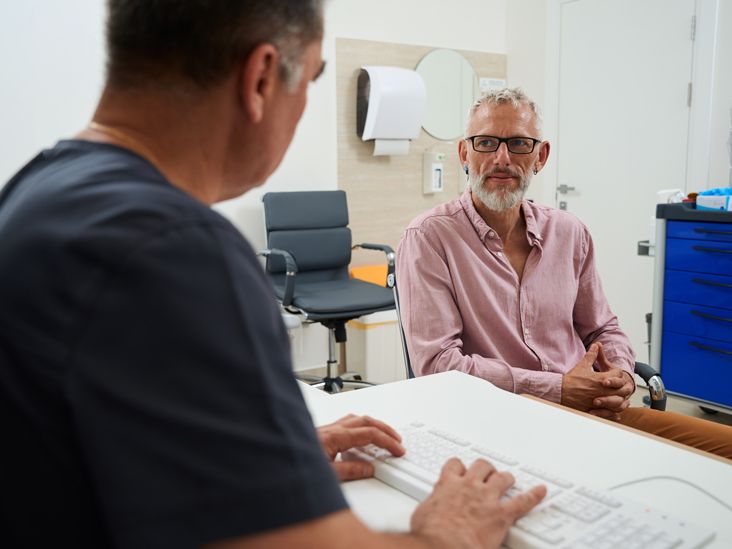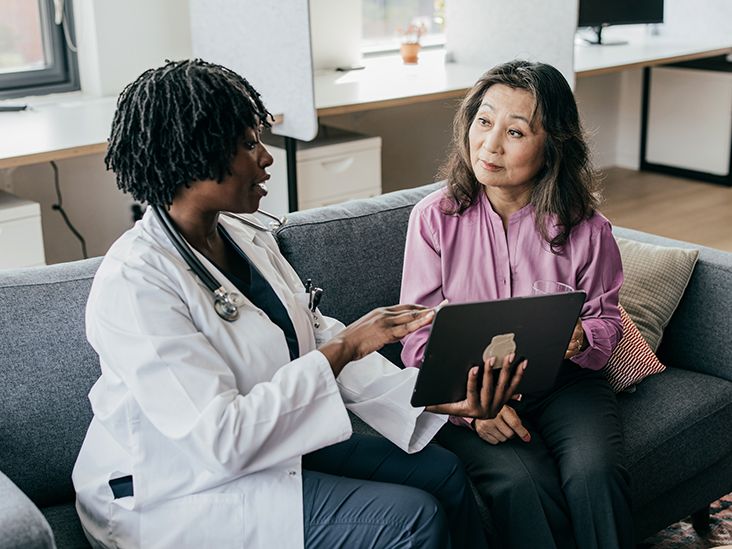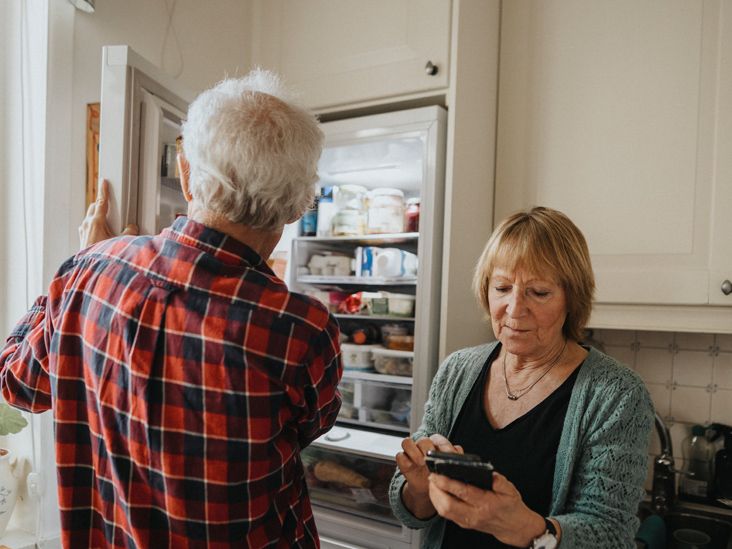A colonoscopy can help your doctor find precancerous polyps, early colorectal cancer, or other health conditions that may be affecting your colon or rectum. Early diagnosis and treatment may improve outcomes.
Colorectal cancer is cancer that starts in your colon or rectum. It often starts out as a polyp, which is a small growth of tissue that may become cancerous over time.
Your doctor may recommend a colonoscopy to check for polyps and other tissue changes. Your doctor will explain how to prepare for a colonoscopy before the procedure. They may ask you to temporarily adjust your diet and take bowel preparation medication to empty your bowel of feces (stool).
Your doctor may recommend a colonoscopy to check for
Read on to learn more about colonoscopy preparation, including questions to ask your doctor.
Your doctor will ask you to take bowel preparation medication before your colonoscopy. It will contain one or more laxative agents to stimulate bowel movements and remove feces from your rectum and colon.
Multiple types of bowel preparation medication are available.
Consider asking your doctor:
- Which types of bowel preparation medications are suitable options for me?
- What are the potential benefits and drawbacks of each type?
- Do you recommend one type over the others? Why?
Let your doctor know if you have kidney disease, liver disease, heart disease, or other health conditions. Certain types of bowel preparation medication may be safer than others for people with certain health conditions.
Learn more about different types of bowel preparation.
Polyethylene glycol (PEG)
PEG is an osmotic laxative that pulls water into your bowel to stimulate bowel movements and flush out feces. PEG bowel preparations combine PEG with an electrolyte solution to help prevent dehydration and keep your electrolyte levels balanced. They come as a powder that you mix with water.
Multiple types are
- High volume PEG preparations require you to drink up to 4 liters of solution. Examples include GoLYTELY, NuLYTELY, CoLyte, GaviLyte, and TriLyte.
- Low volume PEG preparations require you to drink smaller amounts of solution. Examples include Miralax, Moviprep, and PLENVU. Moviprep combines PEG with ascorbic acid.
Some PEG preparations require you to drink other clear fluids in addition to the bowel preparation solution.
Some of these preparations taste less salty than others or include fruit flavorings or sweeteners to make them taste better. You might find these easier to drink.
Combination preparations
Some bowel preparations contain a combination of osmotic laxatives, stimulant laxatives, or both. Stimulant laxatives cause muscles in your intestines to contract to help move stool through them.
Here are some bowel preparations that contain a combination of laxatives:
- Clenpiq: a combination of sodium picosulfate, magnesium oxide, and citric acid in a liquid solution that you drink in two doses
- Suprep: a combination of sodium sulfate, potassium sulfate, and magnesium sulfate in a liquid solution that you drink in two doses
- Sutab: a combination of magnesium oxide and citric acid that you take in multiple tablets while drinking plenty of water to prevent dehydration
Bisacodyl
Bisacodyl is a stimulant laxative that causes your intestines to contract to increase bowel movements.
You can buy oral bisacodyl without a prescription under brand names such as Carter’s Little Pills, Correctol, Dulcolax, and Feen-a-Mint. These products come as tablets that you swallow.
Your doctor might ask you to take oral bisacodyl in addition to another bowel preparation medication before your colonoscopy. Do not combine multiple types of bowel preparation or laxatives unless your doctor asks you to.
They might recommend a bisacodyl suppository, which is a small tablet that you insert into your rectum to stimulate a bowel movement.
Read the instructions that come with your bowel preparation medication carefully and let your doctor or pharmacist know if you have any questions or concerns.
If you’re not sure, ask:
- Do I need to mix the bowel preparation with water or drink any fluids with it?
- Is there anything I can do to make the bowel preparation easier to take?
- Should I take the bowel preparation in a single dose or multiple doses?
- When should I take the recommended dose or doses?
- How long does it usually take to work?
- What should I do if it has no effect?
Depending on the type of bowel preparation, you might need to take it in a single dose or multiple split doses in the days or hours before your colonoscopy.
Some people find the taste of bowel preparation solution unpleasant or have difficulty drinking the full dose. Drinking the solution cold or through a straw might help.
Three Colonoscopy Prep Tips from Fight CRC
1. What Not to Eat Before Colonoscopy Prep
- Nuts and seeds (including wraps and breads containing them)
- Popcorn
- Red meat
- Fried, heavy foods
- Raw vegetables
- Corn, peas, apple skins, and other fiber-filled foods that are hard to digest
- Anything bright red in color
2. Get Wet Wipes
Several brands produce medicated and non-medicated wet wipes.
3. Soft and Strong Toilet Paper
Double-ply, soft toilet paper will be important as you prep for your colonoscopy. (And a critical must-have if you don’t use moist wipes.) Several brands make “gentle” toilet paper with aloe that can alleviate itching and burning – something that is common when you’re making frequent trips to the toilet.
– from Fight CRC’s article, Colonoscopy Prep: 9 Expert Tips for the Night Before
Talk with your doctor or pharmacist about the potential side effects and risks of bowel preparation medication before you take it.
Consider asking:
- What are the potential side effects and risks of this product?
- Are there any serious side effects or complications that can occur?
- Can I take steps to prevent or limit side effects or complications?
- How will I know if a side effect or complication has developed?
- What should I do if a side effect or complication develops?
Common side effects include:
- abdominal pain
- cramping
- bloating
- flatulence (gas)
- nausea
- vomiting
- diarrhea
- anal or rectal pain
Bowel preparation may cause dehydration and electrolyte balances, which can cause
Certain types of bowel preparation medications may be more likely than others to cause side effects or complications. Some health conditions may increase your chances of experiencing certain side effects or complications.
Talk with your doctor to learn which type of bowel preparation may be safest for you.
They can help you learn how to limit, recognize, and manage potential side effects and complications.
Your doctor can also help you learn about the potential risks of colonoscopy itself, including how to recognize and manage potential complications that might occur.
Your doctor might ask you to temporarily change your diet before a colonoscopy to reduce the amount of stool in your rectum and colon.
Consider asking them:
- Should I adjust my diet before the colonoscopy?
- Which specific foods or drinks should I avoid?
- When should I start avoiding them?
- What can I eat or drink instead?
Your doctor might ask you to avoid high residue foods for a few days before the colonoscopy. High residue foods contain a lot of insoluble fiber, which increases the amount of stool in your colon.
Here are some high residue foods they may ask you to avoid:
- nuts and seeds
- corn and popcorn
- beans, lentils, and peas
- fruits with small seeds
- raw vegetables
Your doctor might ask you to avoid solid foods entirely and stick to a clear liquid diet for a day before your colonoscopy. Consider asking them for a list of clear liquids that you can you drink. They may also share tips for managing hunger when you’re avoiding solid foods.
Additionally, your doctor might ask you to avoid foods and drinks that have red or purple coloring for a day or more before your colonoscopy. These foods and drinks can cause your colon or rectum to appear red. A doctor might mistake that red coloring for a sign of inflammation.
Let your doctor know if you take any medications or supplements. Certain medications or supplements may raise your risk of complications from colonoscopy or interact with certain bowel preparation medications.
If you take medication to manage diabetes or your weight, you might need to adjust the dose if you stop eating solid foods or make other diet changes before your colonoscopy.
Ask your doctor:
- Should I stop taking any medications or supplements before my colonoscopy or adjust the dose I take?
- What are the potential benefits and risks of stopping the medication or adjusting the dose?
- When should I stop taking it or adjust the dose?
- When can I start taking it again or return to my usual dose?
Sometimes the risks of stopping a medication might outweigh the benefits.
Your doctor can help you weigh the potential risks and benefits.
Bowel preparation medication can cause multiple bowel movements over several hours, along with symptoms such as cramping, abdominal pain, and irritation or discomfort around your anus or rectum.
Consider asking your doctor how to prepare for the effects.
For example, they might encourage you to:
- take time off from work while taking the bowel preparation
- stock up on soft, strong toilet paper and wet wipes
- apply Vaseline, diaper rash cream, or another cream or ointment to your anus or rectum if you develop irritation or discomfort in the area
It’s important to stay near a bathroom after you take the bowel preparation medication. It may start to work within minutes to several hours. Urgent bowel movements and diarrhea are common.
Contact your doctor if you don’t have a bowel movement within a few hours after taking the bowel preparation medication. They might ask you to take another dose of the medication or take another laxative or enema. They may need to reschedule the colonoscopy if the bowel preparation doesn’t work.
Your doctor might ask you to adjust your diet, adjust your medication regimen, and take bowel preparation medication to get ready for a colonoscopy. Ask them about each step to learn what it involves.
Talk with your doctor or pharmacist about the potential risks and side effects of bowel preparation medication before you take it. Ask them how you can prevent, recognize, and manage potential side effects and complications.
Do not combine multiple bowel preparation medications, laxatives, or enemas unless your doctor asks you to do so.
Contact your doctor if you don’t have a bowel movement within a few hours after taking bowel preparation medication. They may ask you to take more medication to promote bowel movements.
Your doctor can also tell you what the colonoscopy itself will involve, including the potential benefits and risks of the procedure.











